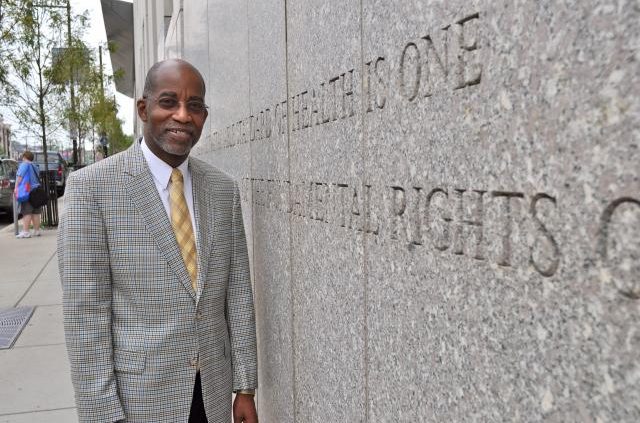Meet the Man Who Proved That Discrimination Can Make You Physically Sick
Dr. David Williams pioneered three ways to prove the links between discrimination and poor health.
An ever-growing body of research in the fields of public health, sociology and medicine is presenting a strong case for something you may personally know to be to true: Experiencing discrimination is bad for your health.
Dr. David Williams, a sociologist, public health researcher and African-American studies professor, is a leader in this field. He has spent decades creating tools that allow for the scientific measurement of discrimination and its impacts on health.
Williams started his career as a health educator at a Michigan hospital, and he says his work there led him to explore the links between individual behavioral changes and the limitations of a person’s social environment. From there he pursued a Ph.D. in sociology. Williams is currently a professor of public health, sociology and African-American history at Harvard University.
Colorlines spoke to Williams via phone about his work and the incredible body of research about discrimination and health. The interview has been edited for length and clarity.
What led you to research the links between racism and health?
I was writing a review of the 1992 book “Health Issues in the Black Community,” an edited volume talking about challenges that the Black community faced. Almost every single chapter referred to racism or discrimination as a factor adversely affecting the health of the African-American community. I was totally in agreement with that, on the one hand, but on the other hand it struck me that the authors were fairly casually asserting that racism was a factor with no empirical evidence. I was really struck by that and felt that we needed to do better.
Did you face a lot of resistance to the idea of measuring racism?
Yes. People who don’t believe that racism matters are going to dismiss us as ideologically-driven rather than scientifically-driven. Once I was on the closing panel [of a meeting about minority health]. One of the priorities for the future was for us to document the ways in which racism impacts health. A well-intentioned White researcher stood up and said he agreed that racism was important, but what I was asking them to do was impossible because racism could not be measured. I [responded], “If you ask me today if we have good reliable measures to measure racism, we don’t. But I don’t see why we couldn’t. We measure self-esteem.” That was part of the impetus to capture ways to measure racism and its impacts.
We now know that discrimination is linked to higher blood pressure, to high levels of inflammation, to low infant birth weight.
Tell me about the tools you’ve developed.
[I’ve developed] three main questionnaires. [The first is about] major experiences of discrimination, like, “Have you ever been unfairly fired or denied a promotion, [harassed by the] police, or discouraged by an advisor from continuing your education?” It’s meant to capture big events that could occur in multiple domains of life.
[The second is the] everyday discrimination scale, which has been used much more widely. The findings are much more striking. It captures what we call microaggressions, the little indignities of everyday life. [Things like] poorer service, when people act as if you are not smart or as if they are afraid of you. It’s a nine-item measure and has proven to be a powerful predictor of physical health.
[Lastly] there is the heightened vigilance scale. How often do you prepare for insults, avoid certain social situations or places? It was really looking at to what extent are people engaging in a range of activities to protect themselves. It reflects the extent to which the potential reality of discrimination makes you unable to relax. We now have studies that show that this vigilance has negative impacts on health. [Just] the threat of discrimination can adversely impact health.
What types of discrimination do these tools measure?
They are not framed explicitly about race. After they describe the event, we ask people what they think was the reason for the discrimination.
What led you to focus on discrimination?
My interest in discrimination was driven by my interest in the health of African-Americans. [I was] struck by the fact that research clearly indicated that [even] at the same level of income and education, across Whites and African-Americans there was still was a racial effect. What else is it about race that is driving these patterns? I was interested in unpacking the added burden of race.
How are you measuring the negative impacts on health?
Early research used self-reported measures of health—mental and physical. From a scientific point of view this was a significant weakness for these studies because they rely on self-reports.
We now have research studies that link discrimination to objectively measured physiological symptoms. We now know that discrimination is linked to higher blood pressure, to high levels of inflammation, to low infant birth weight. Discrimination predicts higher levels of mortality. People who experience it are literally more likely to die.
Is one type of discrimination worse for your health than another? Like is racism worse for you than sexism?
To date, the jury is still out. We are not finding that the type or attribution matters—race is not more impactful. One of the things about discrimination is there is a certain degree of ambiguity: Is it you or is it them? If they are picking on you, is it because of your race or your gender?
Do certain groups experience higher levels of discrimination?
Socially stigmatized racial and ethnic minorities in the U.S. [do] report higher levels of discrimination than Whites. Exactly which racial group is most disadvantaged on racial discrimination is less clear. We haven’t had enough studies that look across multiple racial and ethnic populations.
This year the American Psychological Association stress study focused on discrimination. It’s a national online survey that found that American Indians have the highest [levels of stress from discrimination.]
What is the connection between stress, health and racism?
Discrimination predicts poor mental health—[like] depression and anxiety, which are predictive of heart disease. By negatively affecting mental health, you have physiological changes that have impacts on health in the body.
Discrimination [also] adversely impacts multiple health risk behaviors. People who report higher levels of discrimination are more likely to smoke tobacco, use alcohol in unhealthy ways, [and have] higher levels of drug use.
It also leads to a number of pre-clinical indicators of health problems— high blood pressure, inflammation—and then we have a number of studies as well that indicate that discrimination is also directly linked to poor health outcomes. The evidence is quite striking.
Where do you think we are with the larger public acknowledgement of the connection between discrimination and health?
On the one hand, within the scientific literature, in the early days I could count on two hands the scholars [working on this issue]. Now the work is global. Now there are studies in all racialized societies across the world. [There are] so many studies coming out now that it is hard to keep up. Within the scientific world and the public health field there is increased awareness of discrimination and its negative consequences.
I think in the general public there is growing awareness but there is also considerable resistance. There is one subgroup of Americans that would like to think that discrimination doesn’t exist and that people are making things up. There is another that wants to believe that systemic discrimination is a thing of the past. So I would say there [are] a range of views out there and a lack of awareness.
What are some interventions that you’ve seen work in ameliorating the effects of discrimination on health?
In the early days, our central focus was measur[ing] discrimination and [proving] that it mattered for health. The scientific world was skeptical. We faced an uphill path.
Today, there is increasing attention even at the individual level to what are some of the strategies that might be useful to reduce the negative effects of discrimination. There are several individual and social resources. One is social relationships from family, friends and school. Receiving emotional support from others seems to reduce the negative impacts of discrimination. Religious involvement can [also] buffer or reduce the impacts. There is some work that suggests that meditation and mindfulness also reduces the negative effects. A sense of racial identity can reduce the negative effects. These buffers or resources are consistent with the larger literature on stress and other stressful life experiences.
Source: http://www.colorlines.com/articles/meet-man-who-proved-discrimination-can-make-you-physically-sick



Leave a Reply
Want to join the discussion?Feel free to contribute!